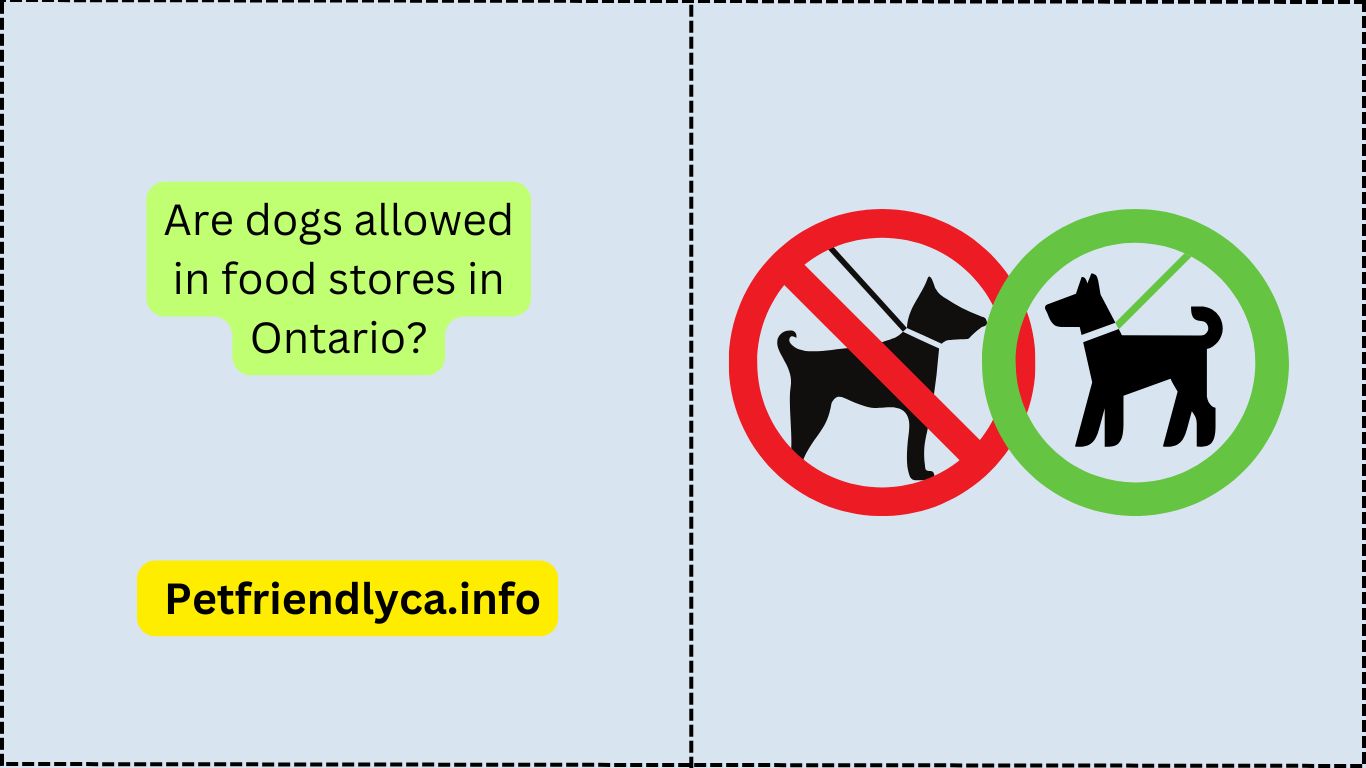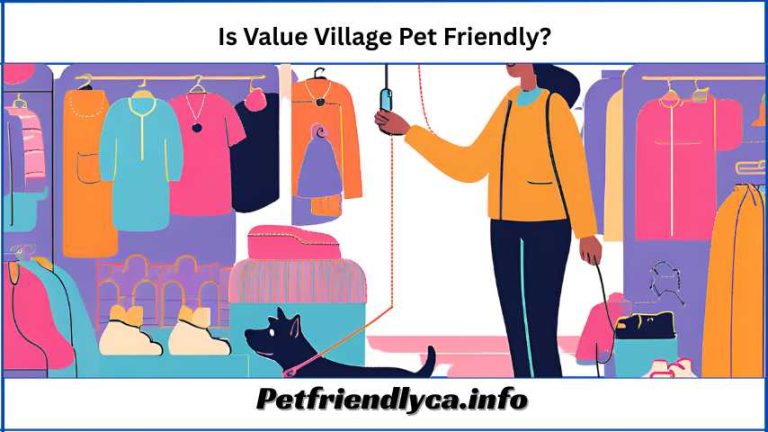Are dogs allowed in food stores in Ontario? | Pet Guide
Ever wondered if your furry companion can join you while grocery shopping in Ontario? This question affects thousands of pet owners across the province who prefer not to leave their four-legged friends at home.
The relationship between pet policies and public health creates a complex situation. In Canada, products meant for animals don’t undergo the same rigorous testing as human food. Pet treats and kibble can harbour harmful bacteria like Salmonella and E. coli, potentially creating health risks in food establishments.
Ontario maintains specific grocery store regulations designed to balance the needs of pet owners with public safety concerns. These rules differ significantly when comparing service animals to everyday companion pets. Understanding these distinctions helps prevent uncomfortable situations at store entrances.
For dog owners in the province, knowing when and where your canine friend is welcome saves time and prevents frustration. Local health departments enforce these regulations to maintain food safety standards while accommodating legitimate assistance animals.
This guide explores the complete picture of Ontario’s approach to pets in food premises, helping you navigate shopping trips with confidence whether you have a service animal or a beloved pet.
Ontario Regulations for Dogs in Food Stores
When it comes to bringing your furry friend shopping, Ontario has established clear guidelines that govern the presence of dogs in food stores. These regulations prioritize public health while balancing the needs of pet owners. Understanding these rules helps both shoppers and store owners navigate this sometimes confusing area.
The province’s approach to dogs in food establishments is primarily guided by public health considerations and is enforced through specific legislation. These rules apply to grocery stores, supermarkets, bakeries, and other food retail environments throughout Ontario.
Ontario Food Premises Regulation
The primary legislation governing this issue is Ontario Regulation 493/17, part of the Health Protection and Promotion Act. This regulation specifically addresses animals in food premises in Section 60, which states that live animals are generally not permitted in places where food is manufactured, prepared, processed, handled, served, displayed, stored, sold, or offered for sale.
Health inspectors across the province enforce these food safety guidelines during regular inspections of retail establishments. Violations can result in warnings, fines, or other enforcement actions depending on the severity and frequency of non-compliance.
Local public health units interpret and apply these regulations, which means there may be slight variations in enforcement across different Ontario municipalities. However, the fundamental principle remains consistent: protecting food from potential contamination.
Public Health and Food Safety Concerns
The restrictions on dogs in food stores stem from legitimate health concerns. According to the Public Health Agency of Canada, pet food and treats can harbor bacteria that cause human illness. Even healthy-looking pets can spread harmful germs to people who come into contact with them or their environment.
Key concerns that shape these retail business practices include:
- Risk of direct food contamination from animal hair, dander, or saliva
- Allergic reactions among other customers
- Potential for accidents or behavioral issues in busy store environments
- Cross-contamination between pet-contacted surfaces and food display areas
These regulations reflect a balance between accommodating pet owners and protecting public health. While they may seem restrictive to dog owners, they’re designed to maintain food safety standards that benefit all consumers under Ontario public health laws.
Are Dogs Allowed in Food Stores in Ontario?
For dog owners in Ontario wondering if they can bring their pets grocery shopping, the answer is generally straightforward but comes with important nuances. Provincial regulations prioritize food safety and public health, which directly impacts pet policies in establishments where food is sold. Understanding these rules can save you from uncomfortable situations and help ensure both animal welfare and public health standards are maintained.
General Prohibition for Companion Dogs
In general, companion dogs are not permitted in Ontario food establishments. This prohibition stems from the Ontario Food Premises Regulation, which aims to prevent potential contamination and maintain hygiene standards in places where food is prepared, sold, or consumed.
The restriction applies to most indoor food retail settings including:
- Grocery stores and supermarkets
- Bakeries and delicatessens
- Convenience stores with food sections
- Indoor farmers’ markets
This prohibition exists primarily because pets can introduce allergens, bacteria, and other contaminants into food environments. Even well-behaved dogs may shed hair or dander, which poses health risks in settings where food is exposed or prepared.
Store-Specific Policies and Enforcement
While provincial regulations provide the framework, individual stores often develop their own specific policies within these guidelines. Retail business practices regarding pets can vary significantly from one establishment to another.
Some stores may post clear signage about their no-pets policy, while others might have staff members who verbally inform customers. Enforcement approaches also differ—some establishments strictly prohibit all non-service animals, while others might be more lenient in certain areas.
You may occasionally notice exceptions such as:
- Dogs allowed in outdoor sections of farmers’ markets
- Pets permitted in store entrance areas or vestibules
- Small dogs carried in enclosed carriers in some establishments
When in doubt, it’s always best to call ahead and ask about a store’s specific pet policy before bringing your dog along. Many food retailers now clearly state their animal policies on their websites or at store entrances to help pet owners plan accordingly.
Service Animals and Legal Exceptions
Unlike regular companion dogs, service animals have protected access rights to Ontario food establishments under specific disability legislation. These important exceptions recognize the essential role that service animals play in supporting individuals with disabilities. While health regulations generally prohibit dogs in food stores, the law makes specific accommodations for working animals that perform vital tasks for their handlers.
Service Dogs vs. Emotional Support Animals
It’s crucial to understand the distinction between service dogs and emotional support animals in Ontario. Service dogs are specially trained to perform specific tasks directly related to a person’s disability. These tasks might include guiding individuals with vision impairments, alerting those with hearing loss, or assisting people with mobility challenges.
Emotional support animals, while valuable for providing comfort, do not receive the same legal protections in Ontario. Unlike service dogs, they lack specific task training and are not covered under the same access rights legislation. This distinction is important because only properly trained service animals qualify for guaranteed access to food establishments under provincial law.
Accessibility for Ontarians with Disabilities Act (AODA)
The Accessibility for Ontarians with Disabilities Act (AODA) provides the legal framework that protects guide dogs and other service animals in public spaces. Under this legislation, businesses—including food stores—must allow service animals to accompany their handlers in all areas where the public is normally permitted.
Store owners cannot demand certification or formal documentation as a condition of entry. The AODA recognizes that service animal access is a fundamental aspect of accessibility for disabilities. Businesses that deny entry to legitimate service animals may face complaints to the Human Rights Tribunal of Ontario and potential penalties for non-compliance.
Proper Documentation and Etiquette
While formal certification isn’t required by law, handlers may find it helpful to carry identification indicating their animal’s service status. When entering food establishments with a service animal, it’s good practice to ensure your animal wears a vest or harness identifying it as a service animal. Store staff may ask if the animal is a service animal required for disability, but cannot inquire about the nature of the disability itself.
Conclusion
Understanding whether dogs are allowed in food stores in Ontario comes down to a clear regulatory framework. The general rule remains that companion dogs are not permitted in establishments where food is sold or prepared, with strict exceptions for service animals as protected by the AODA.
For pet owners planning errands, several alternatives exist. Many grocery chains offer curbside pickup or delivery services, allowing you to shop without leaving your furry friend alone. Some pet-friendly retailers with outdoor sections may provide designated areas where dogs can wait safely while you shop.
When visiting stores, always check their specific pet policies before arriving. Most food establishments display signage indicating their stance on animals, helping you plan accordingly.
The balance between public health concerns and animal welfare considerations shapes these regulations. By respecting these guidelines while advocating for appropriate accommodations for service animals, we create safer, more accessible spaces for everyone in Ontario communities.
FAQ
Are regular pet dogs allowed in grocery stores in Ontario?
No, companion dogs are generally not permitted in Ontario food stores. The Ontario Food Premises Regulation (O. Reg. 493/17) under the Health Protection and Promotion Act prohibits live animals in places where food is prepared, processed, handled, served, displayed, stored, sold, or offered for sale. This regulation exists to maintain food safety standards and prevent potential contamination.
What’s the difference between service dogs and emotional support animals in Ontario?
Service dogs are specially trained to perform specific tasks for people with disabilities and are legally permitted in food stores under the Accessibility for Ontarians with Disabilities Act (AODA). Emotional support animals, while providing comfort, don’t have specific task training and aren’t granted the same access rights to food premises under Ontario regulations.
Can I bring my service dog into a grocery store in Ontario?
Yes, service dogs are legally allowed to accompany their handlers into food stores in Ontario. The Accessibility for Ontarians with Disabilities Act (AODA) protects the rights of individuals with disabilities to be accompanied by their service animals in places where food is sold or served, overriding the general prohibition in the Food Premises Regulation.
What documentation do I need for my service dog when entering a food store?
Under the AODA, store staff may only ask for documentation if it’s not visually apparent that your dog is a service animal. This documentation must be from a regulated health professional confirming that you require the animal for reasons relating to your disability. You’re not required to disclose your specific disability, just that the service animal is needed.
Can stores in Ontario create their own policies about dogs?
While stores must comply with provincial regulations prohibiting animals in food premises, they can implement their own policies regarding where animals may be permitted in non-food areas. However, these policies cannot contradict the legal requirements to accommodate service animals under the AODA. Some stores may have designated areas where pets can wait, such as outdoor spaces or vestibules.
Are there any food stores in Ontario where pets are allowed?
Generally, indoor food stores prohibit pets due to health regulations. However, some outdoor farmers’ markets may have more flexible policies, particularly in open-air sections where food is packaged. Always check with the specific establishment before bringing your pet, as policies can vary and are subject to local public health enforcement.
What are the penalties for bringing a non-service dog into a food store?
Store management can ask you to remove your pet from the premises. Businesses that allow non-service animals in food areas can face fines from public health inspectors for violating the Ontario Food Premises Regulation. Repeated violations could potentially result in more significant consequences for the business, including closure orders in severe cases.
Can I leave my dog tied up outside a food store while I shop?
While this isn’t regulated by food safety laws, many stores discourage leaving dogs unattended outside for animal welfare and liability reasons. Some municipalities have bylaws against leaving animals unattended in public spaces. If you must leave your dog outside, ensure it’s for a very brief period in appropriate weather conditions, with proper restraint, and where you can maintain visual contact.
Do grocery delivery services solve the problem of shopping with pets?
Yes, grocery delivery and curbside pickup services offered by many Ontario retailers provide convenient alternatives for pet owners who don’t want to leave their dogs at home. These services allow you to shop without having to bring your dog to the store or leave them unattended, making them popular options for pet owners.
How do I report a food store that’s not allowing my legitimate service dog?
If a food store denies access to your legitimate service dog, you can file a complaint with the Accessibility Directorate of Ontario. You can also contact the Ontario Human Rights Commission, as refusing service to someone with a disability accompanied by a service animal may constitute discrimination under the Ontario Human Rights Code.







